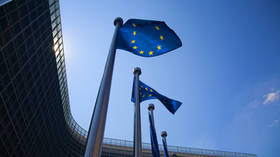
The measures targeting Minsk mirror some of those taken against Moscow, and are expected to address attempts to evade restrictions

© Getty Images / FrankyDeMeyer
The Council of the European Union has introduced a new package of sanctions against Belarus. The measures echo a number of restrictions that Brussels had previously introduced against Russia.
The move is expected to make EU sanctions against Moscow more effective by addressing the circumvention of existing anti-Russian restrictions, according to a statement released by the council on Saturday.
“The close integration of the Russian and Belarusian economies has substantially facilitated the circumvention of existing sanctions against Russia,” the statement reads. “This new set of sanctions against Belarus mirrors several of the measures already imposed on Russia, making EU sanctions against Russia more effective.”
The new set of measures bans the direct or indirect import of gold and diamonds from Belarus, along with helium, coal and mineral products, including crude oil. It also prohibits the export of goods and technologies “suitable for use in oil refining and the liquefaction of natural gas.” Exports to Belarus of maritime navigation goods and technology as well as luxury items are now also barred.


Read more
Brussels has also broadened the ban on the transport of goods by road within the territory of the bloc by trailers and semi-trailers registered in Belarus, including those hauled by trucks registered outside the country. Providing a wide range of services to Belarus, its government, public bodies, corporations, agencies, and citizens has been banned by the latest measure as well.
The EU Council stressed that the move comes in response to support that the Belarusian government allegedly provides to Moscow amid the ongoing military conflict in neighboring Ukraine.
After the launch of Moscow’s military campaign against Ukraine, Brussels ramped up sanctions against Belarus, citing its involvement in the conflict. While the measures were much more lenient than the ones targeting the Russian economy, the EU still banned the export of dual-use goods and technology to Belarus, as well as a wide range of industrial products, while targeting the country’s financial sector. Both Belarus and Russia have denounced the sanctions as illegal.
Belarusian officials had previously said they are trying to mitigate the impact of the sanctions by altering customs legislation and organizing complex logistical chains. Earlier this year, lawmakers in Minsk passed a bill allowing the legal sale of sanctioned goods that are marked as being in transit.